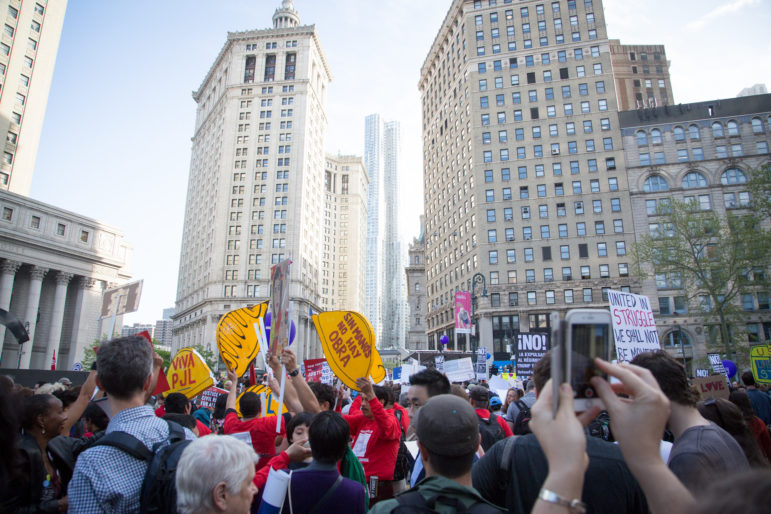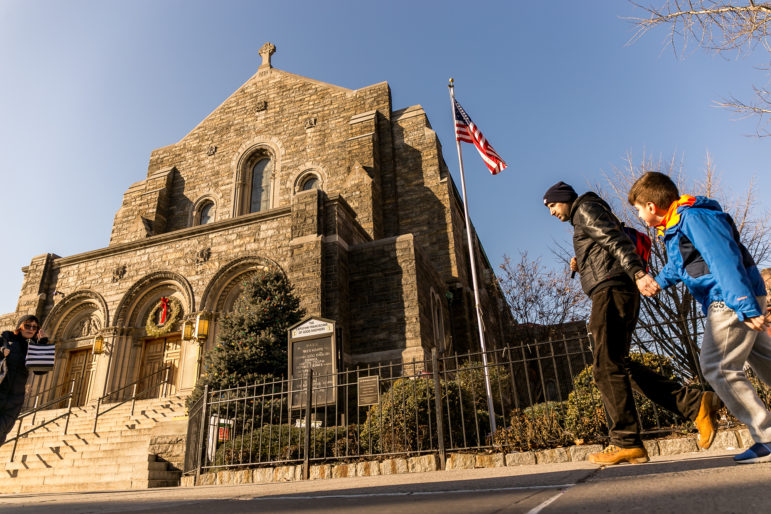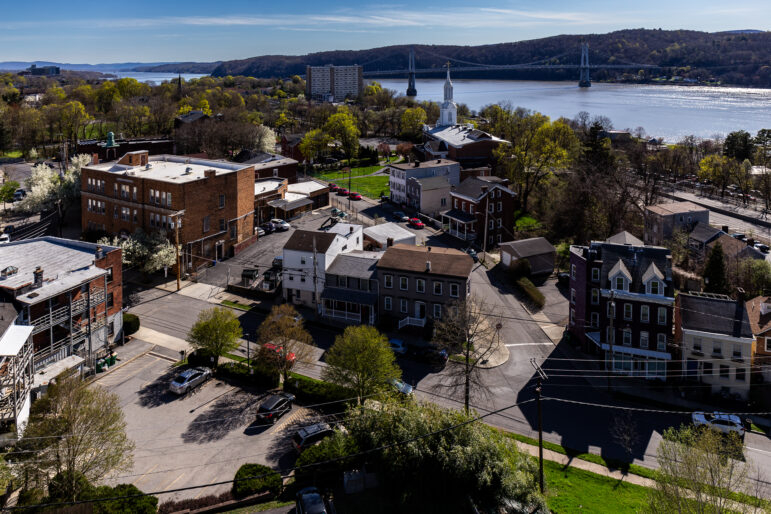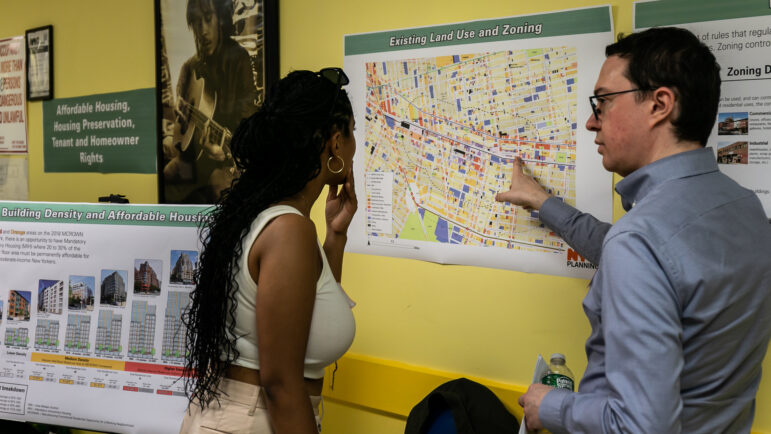‘Immigrants are forced to live in a system with arbitrary restrictions that discourage us from advancing our education, obtaining a stable career, and providing for our families. All the while, our community is continuously relied upon as key drivers of the state’s economy.’

Edwin J. Torres/Mayoral Photo Office.
A rally for New York City’s immigrant workers in 2017.Lea la versión en español aquí.
About five years ago, my parents brought me to the United States in search of a better life from my beautiful country, Colombia. I’m currently a freshman at Baruch College, the first in my family to go to college in the U.S., where I’m studying political science to pursue a career in immigration law so I can help future generations of young immigrants find their place in society too. I am the oldest daughter in my family and carry a lot of the responsibilities in this role—to support my brother and parents in this country we now call home.
My journey, like many other immigrant students, was not easy. There were times when I wanted to expand access to opportunities and benefit my community; however, I was limited by my immigration status. As a high school student a job opportunity arose, but I was ineligible because I lack a social security number. I felt trapped within a failed immigration system that was holding me back at a time I was supposed to be working towards my dreams and potential alongside my classmates.
After graduating from high school and starting my first semester of college, I realized the ongoing challenges I will experience due to my status. From not having access to federal financial support in college to having limited options for work, the barriers can feel incredibly overwhelming. I was fortunate that my former teacher introduced me and my mother to ImmSchools, an immigrant-led non-profit organization that supports undocumented students and families through professional development, immigrant-centered workshops, and immigrant-friendly policy advocacy. Here, I was able to help my peers as they navigated the post-secondary education process and share my story with educators in New York City public schools. This experience made me realize all the systemic barriers that exist for immigrants to determine their career path.
Today, federal and state laws do not allow undocumented immigrants to obtain professional licenses and permits to become teachers, plumbers, nurses and other medical professionals which sacrifices the investments our country has made in our education. It also limits our potential contributions. While there are certain exceptions for immigrants with temporary deportation protections and work authorizations under Deferred Action for Childhood Arrivals (DACA) or Temporary Protected Status (TPS) programs, these initiatives are just that, temporary, and they extend to a small portion of New York’s 100,000 young undocumented immigrants who came here as children—otherwise known as Dreamers. Further, if these meaningful programs were to end, those immigrants may lose their licenses or not be able to renew them due to unjust state laws.
READ MORE: Brain Waste: Many Immigrants Come With Dreams—and Advanced Training—but Can’t Find Jobs
As a result of these outdated federal and state policies, immigrants are forced to live in a system with arbitrary restrictions that discourage us from advancing our education, obtaining a stable career, and providing for our families. All the while, our community is continuously relied upon as key drivers of the state’s economy.
Today, more than 4.3 million immigrants live in New York—including 676,000 undocumented immigrants, and in the city alone, about half a million undocumented immigrants are part of the essential workforce. Collectively, immigrants pay over $61 billion in annual local, state and federal taxes. As the state works to rebuild from the pandemic, and as even more uncertainty lies ahead, we need pro-immigration policies that attract and retain the diverse talent of the immigrant community.
Gov. Kathy Hochul and state leaders like State Senate Majority Leader Andrea Stewart-Cousins and Assembly Speaker Carl Heastie must enact legislation that will leave a real impact on our society and workforce. Bills like the Empire State Licensing Act will remove barriers so that all New Yorkers who want to better themselves by obtaining professional licensing or necessary permits to develop their specialty or trade and advance their careers can do so. This type of policy could also go a long way in addressing New York’s stagnant and potentially decreasing immigrant population.
I also call on our congressional representatives to pass federal immigration reform that will provide certainty for young immigrants who have lived here nearly all their lives so they can earn an education, build careers, and achieve their dreams. Immigrant students go through primary and secondary school cut off from resources and support their peers were able to access, and we have the chance to set them up to earn success. As I finish my freshman year in college and plan for a future where I am supporting my community, lawmakers must recognize the true value of immigrants by enacting reforms for a more prosperous, welcoming tomorrow.
Valeria Lugo is a first-year student at Baruch College. She is 18 years old and is dreaming of a world where her and her family’s immigration status would not prevent them from accessing opportunity.









5 thoughts on “Opinion: New York Lawmakers Must Support Future Generations of Immigrant Students and Workers”
Enough with supporting immigrant workers. It’s time to concentrate on American citizens; time for Washington and Albany to step up and do the right thing for American citizens, the ones who pay the way through these out-of-control taxes.
Do you hear yourself? You are not “undocumented”, you are in this country illegally. And complaining that you don’t have the same rights as a legitimate US citizen.
You will be welcomed here with open arms. Once you get a visa.
How can I get in touch with the author of this piece? Thank you!
Hi Sumaita, drop me an email and I’d be happy to forward your note along: jeanmarie@citylimits.org. Thanks!
Interesting, isn’t it, that her family came just as she was old enough for high school here? Fact is, she could and should have applied for a legal foreign student visa from Colombia. She could even do that now if she’s less than 18 1/2. Until that age, illegal aliens are able to go back to their own countries and apply for visas without facing the bars to re-entry.
Sounds like she and her family came here largely to avoid legalities like foreign student visas and having to pay foreign student tuition. I’ve taught overseas in the Middle East, and my students had to jump through hoops to get student visas and pay the fees and tuition, but for some reason, this young woman and other “Dreamers” shouldn’t have to.